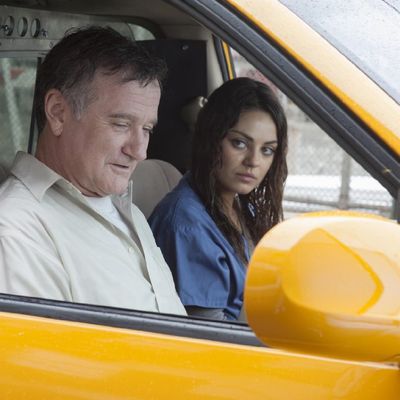
Phil Alden Robinson, who once gave us Sneakers and Field of Dreams (which could have been titled The Nicest Man in Iowa), has not directed a movie since the so-so 2002 studio flick The Sum of All Fears. (Remember that old attempt to turn Ben Affleck into a franchise hero?) So it’s a bit odd to see him now going the indie route with The Angriest Man in Brooklyn, even if it’s with an all-star cast. The film stars Robin Williams as, well, a really angry man whose fury at the world is compounded and complicated when he finds out he’s dying. On paper, it’s an interesting conceit. Williams has been looking to rediscover his “edge” for some years now, so at times the film reads like an attempt to fuse the actor’s darker persona with the cuddly-wuddly side that once churned out insufferable hits like Patch Adams.
Robinson opens with a flashback to 1989, as Henry Altmann (Williams) and wife Bette (Melissa Leo) smile with their kids in a soft-focus haze in Prospect Park, Brooklyn. “What are you thinking?” Bette asks Henry. “That I’m happy,” he replies. Then, quickly, it cuts to the present day: Stuck in traffic in Grand Army Plaza, Henry is fuming. In voice-over, we hear that he had recently added “subwoofers” and “small cars” to his long list of things he hates — an endless litany which includes items such as “double-baby strollers,” “ass-crack fashion,” “new mothers,” “fat people,” radio personalities,” “smell of urine,” “the Knicks, the Knicks, the Knicks, and God.” This opening scene, with overtones of the Michael Douglas–Joel Schumacher white-male-rage flick Falling Down, suggests we’re about to get a meditation on the Revolt of the Privileged.
But the film is actually something of a two-hander, giving equal time to Sharon (Mila Kunis), a young doctor having a very bad day: Her cat just leaped from a window to his death, and she’s still reeling from a nasty breakup with a married man. It falls to Sharon to tell the pissy, rushed Henry that he’s dying of a brain aneurysm. When he demands to know how long he has, she fumbles for an answer, then blurts out, “90 minutes!” Not long after a thunderstruck (and still angry) Henry goes off to try and figure out what to do with the remaining minutes of his life, Sharon heads out to try to find him and correct her mistake.
That decent concept stalls on two fronts. For starters, Williams doesn’t quite seem up to the challenge of the role, which comes as a surprise. In that early traffic scene, a cab sideswipes Henry’s BMW. Henry tells the cabbie to back to where he came from. “Racist!” the cabbie yells. “How can I be racist if I don’t even know what race you are?” “Uzbek!” “Uzbek. You’re right! I hate Uzbeks!” As dialogue goes, this isn’t exactly David Mamet, but you’d think that if anyone can milk humor out of such rapid-fire repartee, it’s Williams. In his heyday, the speed of his delivery was his great weapon; you’d laugh before you had time to decide if the joke was even funny. But here, he just seems tired, hesitant. He squints his eyes and grits his teeth and speaks fast, but without force; the rage isn’t palpable, and in order for this movie to work, the rage has to pop. (Is this just part of the performance? Is the angriest man in Brooklyn also the tiredest man in Brooklyn? It’s not very convincing, if it is.)
Performance aside, the film never quite manages to figure out what it’s actually about. Henry attempts to reconcile with his family — Leo matches him scream for scream — and we learn that he lost a son in a hunting accident. The film has set Henry’s anger up as something of a social touchstone — we’re meant to recognize our own latent and not-so-latent fury in his indiscriminate, constant hatred. But rooting it in a specific, tragic hurt sends the subtext spinning off in another direction. Such thematic confusion is not helped much by the fractured storytelling; one senses that Robinson has a lot more story he wants to tell here, but is rushing to get it all in under a brisk running time. The movie and its characters never breathe.
Still, it’s not without its charms. Kunis, who can often be uneven, is excellent here. She’s often at her best when asked to go big, as she did in Black Swan; when she tries to underplay, she disappears. The movie gives her plenty of big, emotive moments: In fact, when we first see her, she’s in tears. And the great Peter Dinklage, playing Henry’s more responsible, saner brother, is a lagoon of human calm amid the sea of shticky madness. There are good performances and intriguing ideas throughout The Angriest Man in Brooklyn. Unfortunately, they often appear to be searching for a movie to call their own.





